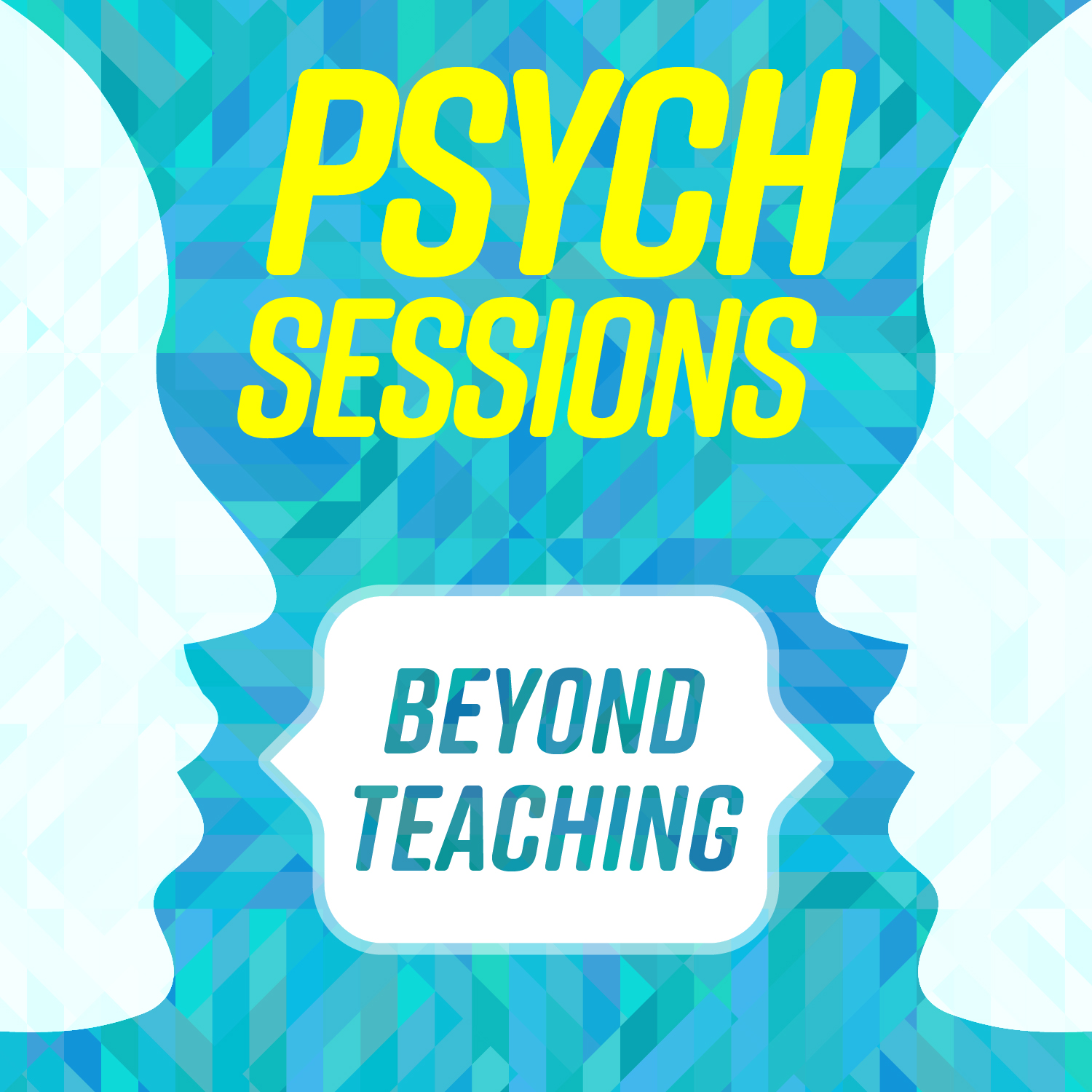579 episodes


In this episode, Garth interviews Stephen Chew about his new writing project, coming on to Sarah Grison's introductory psychology textbook, (along with Ebony Glover).


In this episode Eric interviews Jane Halonen from the University of West Florida in Pensacola, FL. We specifically sat down for this interview to discuss Jane's specialized leadership skills, especially when leading national efforts with many moving parts. We discuss her leadership skills and opportunities, and Bill McKeachie's memory is infused in much of our conversation. There are always challenges with these types of opportunities, whether national news events, a worldwide pandemic, the small-p politics of the task at hand, and more. Jane leverages her clinical skills and her story-telling ability to help with problem-solving amongst talented academics to complete the major tasks (such as being the lead on the APA Guidelines for the Undergraduate Psychology Major, Versions 1.0, 2.0, and 3.0). He chat about Jane's high school leadership experiences as well.


In this episode Eric and special guest host Jane Halonen (University of West Florida) interview Kenn Barron from James Madison University in Harrisonburg, VA. Our thanks to STP for the opportunity to record this interview at the Annual Conference for Teaching in Portland (October 2023). Kenn shares his background growing up in Delaware and the educational influences of his mother and father. He is deeply reflective, whether he is mapping out his career goals and trajectory or considering the three worlds of science (and validity, too). Jane was the chair at JMU when Kenn was hired a quarter-century ago, and Jane proved to be an important mentor in his life. There is a brief conversation about the introductory psychology chapter Eric never teaches, a chat about motivational theory, and much more.


In this episode: We welcome one of our all-time favorite guests, Sue Frantz, to the podcast. Sue talks about her new role as Associate Director of the Society for the Teaching of Psychology (STP). We also get a chance to discuss some of Sue's many contributions to psychology, including multiple blogs, conference presentations, and her published books (and books in the works). We also dip into a conversation about Open Educational Resources (OER).


In this episode: It's all about transitions, whether it's the transition to department chair or back again, the transitions with promotions in academia, sabbatical transitions, thoughts about retirement, and even the transition to leave academia for a different workplace. It's about flexibility and accepting gains and losses in any type of substantial transition.


In this episode: We discuss email, including etiquette matters, the joys, and the burdens of email. We address some email strategies for leaders, and we touch on some available email tools that can make your email-life a bit easier.


In this episode: We have the delightful opportunity to interview two international doctoral students, Moonkyung Min who is from South Korea, and Elvine Andjembe Etogho who is from Gabon in Central Africa. Our conversation touches on language challenges, living outside one's home country, plans for after graduate school, and much more. We engage in a fascinating discussion of deficit-based cultures and strengths-based cultures.


In this episode Eric interviewed six individuals from the American Psychological Association's Guidelines 3.0 Task Force, including Jane Halonen (Chair), University of West Florida, Dave Kreiner, University of Central Missouri, Karen Naufel, Georgia Southern University, Garth Neufeld, Cascadia College, Susan Nolan, Seton Hall University, and Aaron Richmond, Metropolitan State University-Denver. A host of topics are addressed during this group discussion, including (a) how the group worked together, sometimes with challenging topics, (b) how the rollout of Guidelines 3.0 was planned, (c) the development of U.S.-based standards but also welcoming of international participation and input, (d) a look-ahead conversation about Guidelines 4.0, and (e) a conversation about how Guidelines 3.0 might be used, directly or indirectly, in our courses.


In this episode Eric interviews Raechel Soicher from the Massachusetts Institute of Technology (MIT) in Cambridge, MA. In 2022, Raechel became the Assistant Director for Research and Evaluation in the Teaching + Learning Lab. Raechel earned her doctorate during the pandemic and started in an instructor position while also contributing to the Center for Teaching and Learning at Oregon State, her alma mater. Those experiences led to a job search, where Raechel eventually landed at the MIT Teaching + Learning Lab. We discuss job markets in general, costs of living, and making decisions about quality of life issues, and she also reflects on her teaching experiences at Oregon State.


In this Part 2 episode Eric interviews Kristin Whitlock, Director of Assessment for Advanced Placement Psychology at The College Board. Thanks to the Annual Conference on Teaching, this interview was recorded at the ACT 2023 meeting. Kristin shares her "retirement" details from high school teaching after 33 years of service and moves on to new challenges as the Director of Assessment for AP Psychology. Listeners are reminded that teaching DNA is in Kristin's blood; most of her family members are teachers (or retired teachers), and she called her Mom, who taught preschool for 37 years, the "greatest teacher I have ever seen." We discuss so many topics, including her Utah State loyalty, how the pandemic changed her attitude toward teaching, it is revealed that Kristin has a twin sister, and there is even a brief mention of the "pillars."


In this episode Eric and Garth host an invited panel at STP's Annual Conference on Teaching (ACT) 2023 featuring Loretta McGregor (Arkansas State University), Skyler Mendes (Arizona State University), Janet Peters (Washington State University), and Jordan Wagge (Avila University). This session was organized to explore the diversity of careers and career stages within psychology, which includes a discussion of both career challenges and career successes. Worries about the future of our profession are expressed, as well as the importance of cultivating the next generation of psychology educators. Each participant shared important mentoring experiences in their careers. This was followed by question and answer with the audience, where topics such as the complexity of intersectionality, Psychsessions contributions, and a hypothetical "do-over" in one's career were among the topics addressed.


In this episode Garth interviews Todd Joseph from Hillsborough Community College in Tampa, FL. Todd's national leadership stature becomes clear as they discuss the many leadership roles, including Regional Vice President, President, and now the new Executive Director of Psi Beta, his leadership as part of the Committee on Associate and Baccalaureate Education (CABE), his contributions to the Southeastern Psychological Association, and his local leadership as the Division Chair of Public, Social, and Behavioral Sciences. Todd attended a community college as part of his education, and his passion continues in the teaching and research projects that he engages in with his current community college students. He also shares personal stories, including his graduate school education, where the systems in place supported him sometimes and hindered him at other times.


Welcome to the PsychSessions Podference 2024! Our 7pm EST speaker is Ken Keith from the University of San Diego. Ken delivered this invited address at the Northeast Conference for Teachers of Psychology in October 2023: "Fact or fiction" How can students know the difference?" Check out more PsychSessions episodes at https://psychsessions.org


Welcome to the PsychSessions Podference 2024! Our 5pm EST speaker is Eric Landrum from Boise State University. Eric delivered this invited address at the Rocky Mountain Psychological Association in April 2023: "We are family: My RMPA can be your RMPA"


Welcome to the PsychSessions Podference 2024! Our 4pm EST speaker is Noland White from Georgia College & State University. Noland delivered this invited address at the Southeastern Psychological Association in April 2023: "Research on ADHD and its application in the classroom" Check out more PsychSessions episodes at https://psychsessions.org


Welcome to the PsychSessions Podference 2024! Our 3pm EST speakers are Danae Hudson and Brooke Whisenhunt from Missouri State University. They delivered this invited address at the Rocky Mountain Psychological Association in April 2023: "Preventing academic Groundhog Day: Strategies to address predictable difficult concepts" Check out more PsychSessions episodes at https://psychsessions.org


Welcome to the PsychSessions Podference 2024! Our 2pm EST speaker is Melissa (Missy) Beers from the Ohio State University. Missy delivered this Harry Kirke Wolfe lecture at the Southeastern Psychological Association in April 2023: "Sinking, swimming, and treading water: What and how should we be training teaching of psychology?" Check out more PsychSessions episodes at https://psychsessions.org


Welcome to the PsychSessions Podference 2024! Our 1pm EST speaker is Jasmine Mena from Bucknell University. Jasmine delivered the invited address at the Rocky Mountain Psychological Association in April 2023: "Cultivating student sense of belonging inside and outside of the classroom" Check out more PsychSessions episodes at https://psychsessions.org


Welcome to the PsychSessions Podference 2024! Our 11am EST speakers are Sue Frantz (Highline College) and Garth Neufeld (Cascadia College). They participated in this conversation hour at the Teaching Introductory Psychology Northwest conference in April 2023: "A conversation with Sue Frantz about introductory psychology" Check out more PsychSessions episodes at https://psychsessions.org


Welcome to the PsychSessions Podference 2024! Our 10am EST speaker is Bridgette Martin Hard from Duke University. Bridgette delivered this invited address at the Teaching Introductory Psychology Northwest conference in April 2023: "Ignite the fire: Strategies to enhance engagement and belonging in introductory psychology" Check out more PsychSessions episodes at https://psychsessions.org


Welcome to the PsychSessions Podference 2024! Our 9am EST speakers are Garth Neufeld (Cascadia College) and Sue Frantz (Highline College). They delivered this symposium at the Northeast Conference for Teachers of Psychology in October 2023: "Maximizing intro psych's ripple effect: The question of content" Check out more PsychSessions episodes at https://psychsessions.org


Welcome to the PsychSessions Podference 2024! Our 8am EST speakers are Jane Halonen (from the University of West Florida) and Danae Hudson (Missouri State University). They presented this symposium at the Southeastern Psychological Association in April 2023: "APA's Introductory Psychology Initiative: The past, the present, and the future of introductory psychology" Check out more PsychSessions episodes at https://psychsessions.org


Welcome to the PsychSessions Podference 2024! Our 7am EST speaker is Stephen Chew from Samford University. Steve delivered this invited address at the Southeastern Psychological Association in April 2023: "What the best college teachers know" Check out more PsychSessions episodes at https://psychsessions.org


In this episode Garth and Jane Halonen (University of West Florida) interview Christina Maslach from the University of California, Berkeley. This was the West Coast swing of the last leg of the 2023 PsychSessions East Coast Tour. When you have one of the world's leading experts on burnout sit down for a podcast interview, what do you talk about? Burnout! This conversation travels across so many relevant issues for both individual employees and workplace environments, from the matching of values and the importance of fit to solutions being more work-environment-focused rather than individually-focused. The burnout mantra is discussed (doing more with less), and how most of us are not good at subtracting tasks from our work-life. Performance reviews are discussed as well as key research questions in the burnout literature, and more! You may be interested in Christina's new book called The Burnout Challenge: Managing People's Relationships with Their Jobs.


In this sidebar, Garth presents some important end-of-year information about PsychSessions, including the opportunity to make a tax-deductible donation. Please consider supporting the continuation of PsychSessions!


------------------------- -------------------------


In this episode, I interview Jordan Troisi from Colby College. Jordan and I discuss the difference between asking students what they want to “be” and what they want to “do” and the impact family, cultural, and socioeconomic pressures have on students’ career decisions. Jordan describes partnering with a director of career services to redesign a social psychology lab course that provided opportunities for skill development and direct instruction for articulating those skills during interviews. Jordan and I play “Guess the Job Title” and discuss the importance of explicit career preparation instruction.


------------------------- -------------------------


In this episode, I interview Jaye Van Kirk from San Diego Mesa College. Jaye shares fascinating stories of her experiences as a lifelong learner, and we discuss the powerful way she incorporates digital portfolio development in her courses to prepare students to be competitive job applicants. Jaye and I play “Can I Get This Job with an Associate’s Degree?” and talk about examples of alternatives to traditional academic writing assignments she assigns to diversify the artifacts students include in their portfolios


In this episode, I interview Aaron Richmond from Metropolitan State University of Denver. Aaron and I discuss skill development, skill transfer, and how he uses teamwork to help students develop cognitive, communication, personal, social, and technological skills, the five skill domains included in The Skillful Psychology Student. Aaron and I play “Why is This Job a Good Fit for a Psych Major?” and talk about the importance of helping students make explicit connections between what they are learning in each of their courses and the careers that interest them.